Right On Schedule
With a political science degree in hand and a proven ability with details, this alumna is at the center of the president’s day.
Alyssa Mastromonaco ’98 knows how to make things happen.
It started in preschool, when at age four she planned a surprise party for her teacher, divvying up key tasks among her classmates. It continued after she earned her political science degree at UW-Madison, an influential stop on her path to becoming the director of scheduling and advance for the White House, where she now leads an office of thirty-five people and serves as one of a small group of top advisers to President Barack Obama.
During Obama’s campaign for president, Mastromonaco was responsible for duties ranging from heading up the search for his vice president (which she calls “the whole cloak and dagger”), to orchestrating the large rallies that were a signature of the campaign, to managing the combination of planes, trains, and automobiles to get the candidate where he needed to be. It’s no wonder the Washington Post called her Obama’s “Ms. Fix-It” and an “improvisational ace.”
Those accomplishments make it all the more surprising that ten years ago, Mastromonaco wasn’t even working in politics. But her goals changed when a light-bulb moment prompted her to walk away from a lucrative job in New York to make $19,000 a year as a staff assistant in U.S. Senator John Kerry’s Boston office. After Kerry lost his bid for the White House in 2004, Mastromonaco was looking for a respite from the rigors of campaign life. She didn’t want or intend to work for someone who was going to run for president. And so she took a position with a freshman senator from Illinois — Barack Obama.
Mastromonaco recently spoke with On Wisconsin, a conversation edited here for length, about how the UW nurtured her make-it-happen attitude and how she went from struggling to get a foot in the door in politics, to working for Obama when he was just “Barack,” to having an office in the West Wing.
[On Wisconsin] How much is saying “no” part of your job? I’m curious about the volume of requests you must deal with for a piece of the president’s day.
[Mastromonaco] All of the requests are sent to the various departments that they relate to, and then the departments make a decision on whether it gets kicked up to me. … For the most part, we actually are a group of “make it work.” So we don’t actually say “no” as much as people might think. We try to give everybody a chance to get in front of the president and make their pitch.
What are some of the things that have surprised you the most about working in the White House?
Well, things certainly haven’t slowed down from the campaign. … The image, I think, when people say, “Oh, you’re going to work in the government,” is this very bureaucratic, slow, nine-to-five kind of visual. And it’s just not. The pace from the campaign, through the transition, to the White House — the pace hasn’t slowed at all.
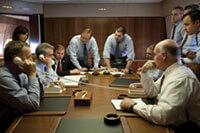
Mastromonaco (standing at left) was aboard Air Force One en route to Iraq in April 2009 with (from left to right) the president’s national security adviser, General Jim Jones; White House Chief of Staff Rahm Emanuel; Deputy Chief of Staff Jim Messina; and Press Secretary Robert Gibbs. ‚ÄúWe were literally changing the trip up until a few hours before we got there,‚Äù Mastromonaco says. Photo: Pete Souza
Before Obama was a candidate for president, you were on his Senate staff and you traveled together for work. I’m curious what you learned about him on those trips.
I traveled with him for probably about 70 percent of the trips that we did in the fall of 2006. [He] is just the easiest person on the planet to get along with. … We drove five and a half hours in rush-hour traffic up to Providence [Rhode Island], and we stopped at the gas station, and we got Snapple and snacks and magazines. And so the president, then-senator, is reading a book, and I had bought all of my trashy magazines, and I put them inside a TIME magazine. Finally, I thought he was asleep, but he wasn’t. He looked over and said, “Give me that.” And so we were reading Us Weekly together.
What drew you to scheduling work?
It’s kind of like a niche, really. … Either you have the mind frame for it or you don’t. I don’t think everyone can do it, just like not everyone can write speeches. [Obama speechwriter] Jon Favreau is one of my greatest friends, and we always laugh that we’re “specialty” folks, because either you can write a speech or you can’t, and either you can do this job or you can’t, because you have to just be able to look at everything A to Z. … Especially on the campaign, it was making sure that every decision you made was economical, that you were using Barack’s time in the best way possible. … We would always make sure that if we were going west, let’s go all the way west. Let’s not go New Hampshire to Iowa, to Florida, to Wisconsin, to New York, to California. Let’s do it in a way that we’re making the most of every single minute of Barack’s time. Make sure he’s not flying during the day when he could be talking to voters. … Make sure that you’re scheduling things in such a way that he has enough time to talk to people, that he’s not rushed, but also that he’s not sitting in a car for thirty minutes waiting for a venue to fill in because he’s so early — which is almost the worst thing you can do.
How did you end up working for [Obama]?
I met with Barack, and he was just — he’s great. He’s real, he’s interested, he really wanted to do things. … Barack called and offered [the job] to me himself. I was in my apartment in D.C. at the time, and I didn’t even realize 773 was a Chicago area code, so I let [the call] go to voice mail because at the end of the Kerry campaign, so many weird people had my phone number. Then I checked [the message and heard], “Alyssa. It’s Obama. I think that we should do this.” It was so fun. … I started the day after Martin Luther King Day — January 18, 2005.
Going way back, you started college at the University of Vermont [UVM], right?
I did.
So why did you decide to transfer to the UW?
I was at UVM [in Burlington], and I had been a French major, with a minor in Japanese, and I really liked Burlington, and I wanted to stay for the summer. I got an internship in [then U.S. Congressman] Bernie Sanders’s district office and I loved it. I did everything. I did constituent stuff. I did fund-raising phone calls. Everyone was so progressive and interesting and they didn’t treat me like I was just twenty — they just treated me like a person. I [thought], “This is what I totally want to do.” I had decided that I wanted to switch and be a poli sci major … but I also was really into French and they were phasing out their French department. My dad worked for IBM at the time and his biggest account was Kraft. He was in Madison all the time and he’s obsessed with Madison. He said, “If you’re going to go anywhere, you should think about this.” … On the day of my orientation, I had never actually been to the campus before. I went to Madison sight unseen … [and] it was terrific. The thing that I left Madison with was: in a big place in the world, you have to find your own way. No one’s going to do something for you, and I think that’s been the thing that’s gotten me through everything. I’ve never sat around and waited for anybody to do anything for me. If I wanted to do something, I made it happen.
That answers my next question: what were some of the most important things you learned [at the UW] that stick with you?
When I graduated from Madison, I thought for sure I would just get a job in D.C. I applied for job after job after job, and it wasn’t working and I wasn’t getting any traction. … I made my way through interesting but disconnected jobs in New York. I worked at an Internet start-up company. I worked at Sotheby’s, the auction house. While I was there I went [to Boston] and heard a speech by John Kerry, and I thought, “What am I doing? Why not roll the dice?” I wrote a letter to their intern coordinator and [essentially said], “Here’s the deal: I know this is what I want to do with my life and I will start at the bottom.” They couldn’t believe it, because here I was — I made good money in New York, I had this office on Madison Avenue, and I just didn’t care. … I took the train up to Boston three times before they hired me. … I started with doing the clips and answering the phones. I have always steadily progressed because you can’t just wait for someone to come and say, “Oh you’re doing a good job.” You have to show that you’re doing a good job every single day. … It makes me very hard on my interns, though; I feel bad for them.
The UW has a history of being a hotbed of political activity. I’m wondering how your time here had an impact on your views.
People would get into heated disagreements, but it was never disrespectful. … The president put it best, “You can disagree without being disagreeable.” Everyone has something to add to the discussion and everybody brings a different perspective, and if you’re not learning from that, you’re just not growing as a person.
So you were part of the small group of people the president conferred with when he was deciding whether to run. And all through the course of the campaign, there was so much history being made. What was it like for you to be a close witness to all of that?
At the time when we started talking about it, he had been to Africa that August, we had been on the book tour all fall, traveling nonstop. … I worked for Barack because I truly wanted to work for someone who I knew would not run for president. That is God’s honest truth. I was tired, I was fat. … Campaigns take a serious toll, and I thought, “This is going to be great. He’ll be interesting, we’ll do good stuff, but it won’t be this national endeavor” — and then it was. … I really, in my heart, didn’t believe we would end up running.
I was thinking about all the details that you have to handle day to day, and I’m wondering how you keep everything straight. How much is technology a part of getting the job done, and, related to that, have you ever wondered how people in your shoes did this job without some of that help?
When I was at the University of Wisconsin, which was ’96, I maybe had a Yahoo! account. E-mail had just kind of taken hold. … For the Clinton campaign in ’92, people didn’t have BlackBerries; they barely had cell phones. What must it have been like? And on the one hand, we have all this technology that helps us, but it also just kicks the pace up that much faster, I think, than it had to have been back in the day, because everything’s instantaneous. … Twenty years ago, something’s important, someone will pick up the phone and call you. But now, you’re just litigating everything until ten o’clock at night and some of it’s not that important. So on the one hand, it does help to spread information … but the negative side of it is that it keeps you working twenty-four hours a day, seven days a week. There’s just no downtime.
Is there a typical day for you?
I usually get [to work] between 6:30 and 7:00. We have a daily 7:30 meeting in [Chief of Staff Rahm Emanuel’s] office. It’s about twelve of us, and we run through the day for an hour, and then we have a larger senior staff meeting at 8:30. Then I have my senior directors department meeting at 9:15, which is just scheduling and advance [work], and then at some point during the day, we have a senior advisers meeting with the president — ten or twelve of us in the Oval Office with him every day. And then I usually leave here sometime between 7:00 and 8:00.
Wow. Long day.
Mmm-hmm.
What kinds of things does [the president] complain about related to his schedule?
He’s really just a very reasonable person, so he never gets really upset about it. … We’ve worked together for five years now. … I can usually see something I know will upset him, [such as] that we’ve put too many things [on his schedule]. The one thing you try not to do is overwhelm a day. You don’t want a foreign leader visit and a major economy meeting and the Make-a-Wish Foundation [all in one day]. There are things that you know are more emotionally or mentally taxing than other things are. So we like to leave flexibility … and we just try to keep certain consistencies, like when he has lunch. We like to make sure he has dinner at home at least three nights a week.
I’m wondering if you’re super organized in your non-work life, because I think some of us might feel better if we knew your checkbook wasn’t balanced.
I just keep a list for every single thing I do … because it’s really easy to just get caught up in taking care and managing someone else’s life and ignore your own.
Obama filled the Kohl Center during the campaign. What was that like? It was your campus; you helped pull that off.
I was so disappointed that I couldn’t be there. … When you work in politics, you get a whole array of people, and you have the Harvard, the Ivy League mafia … but actually, there are a lot of people in my department who went to either the University of Minnesota or University of Wisconsin. … When the president — or then-candidate Senator Obama — goes to people’s alma maters, we always try to send them to be part of the advance team so they get to be there. Because it’s such a moment, it really is. It sounds corny, but you’re so proud. … There are a lot of kids who go to college and you just kind of end up where you end up, but I made such a conscious decision. I went to the University of Vermont, which I liked very much, but I really wanted to go to Madison. [The UW] taught me to be so independent and just take chances and not be afraid. I mean, here I am, I’m going to be thirty-four in a week and I’m an assistant to the president and I have an office in the West Wing … and my school was part of that.
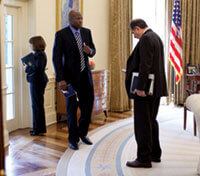
Mastromonaco, here in the White House Oval Office with Obama’s personal aide, Reggie Love (center), and senior adviser David Axelrod, says her time at UW-Madison taught her to take chances and to not be afraid. “I have an office in the West Wing … and my school was part of that,” she says.
I want to close by asking you … what’s the most complicated trip or plan or event you’ve had to help pull off?
[It] would probably be the [April 2009] trip to Iraq that we did. And that was: you can’t tell anybody, nobody can know, you can’t talk to anybody about it. You just have to plan it. I had never been on a helicopter and I was so worried — and I’d never been to Baghdad before.
So you were along?
Yep, we went, too, and you know you have to just be so nimble and have good judgment, because things change on a dime — like suddenly there’s a windstorm and you can’t use helicopters anymore, so you have to change the whole trip. We were literally changing the trip up until a few hours before we got there. But there I was. … You’re in Baghdad and you’re thinking, “Oh, my god, this is so weird. How did I get here?”
Because you organized it.
I know, but that’s one of those moments where you sit there and think, “Wow. This is what I do.”
On Wisconsin writer Jenny Price ’96 is hopeful that spending time working on this story has somehow made her more organized.
Published in the Summer 2010 issue
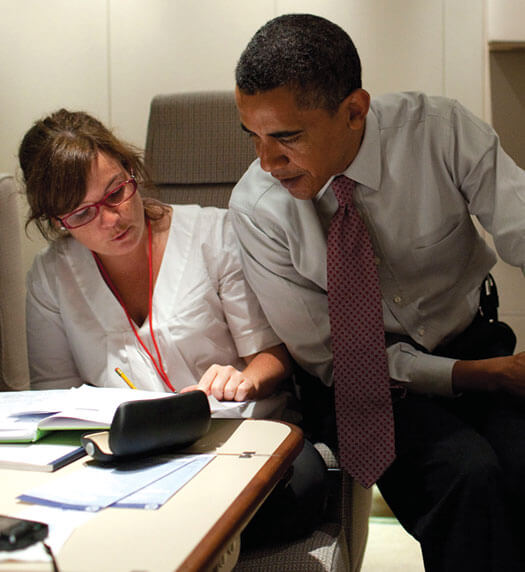
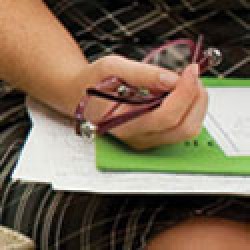
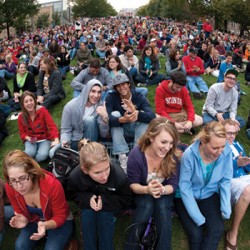
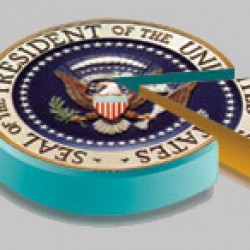
Comments
Heidi July 13, 2010
In reading this, I hope I have become more organized 🙂
Anthony July 13, 2010
A long story
Susann July 13, 2010
A really good story! Inspiring. I like her comment “I left Madison…in a big place in the world, you have to find your own way. No one’s going to do something for you, and I think that’s been the thing that’s gotten me through everything. I’ve never sat around and waited for anybody to do anything for me. If I wanted to do something, I made it happen.”
Coreen July 13, 2010
I do event planning for the University of Wisconsin right now. THis was a very inspiring and interesting story!
Jjames July 13, 2010
Really great article. I especially appreciated the points about being willing to take risks and knowing what you’re good at. Great take-aways for any situation.
Ryan - Poli Sci BA '07 July 13, 2010
Hey great job Alyssa! Keep up the good work!
Andrea - LACIS MA '06 July 14, 2010
This is excellent writing that gives never-before-seen insight into the president’s life, but also a strong indication of Ms. Mastromonaco’s personality and spirit. Loved reading it!
Serge July 14, 2010
Great job Alyssa! your success is our success
Jonathan July 14, 2010
I have been deeply inspired by Barack Obama. To read about Alyssa’s journey, which is even more within my grasp, is exciting and inspiring. I am proud to have graduated from the UW, to have helped elect The President, and grateful to OnWisconsin for publishing this profile.
Christina July 14, 2010
This was an excellent story, great writing… I loved it. I suppose what I liked the most is the tie to UW-Madison and Mastromonaco’s very pragmatic way of describing what she does and her passion for making things happen in her own life. In a way her descriptions of her experiences made Obama very real to me, which is challenging considering the media coverage and sound-bites that we are accustomed to hearing.
JB July 14, 2010
Great article and interview!